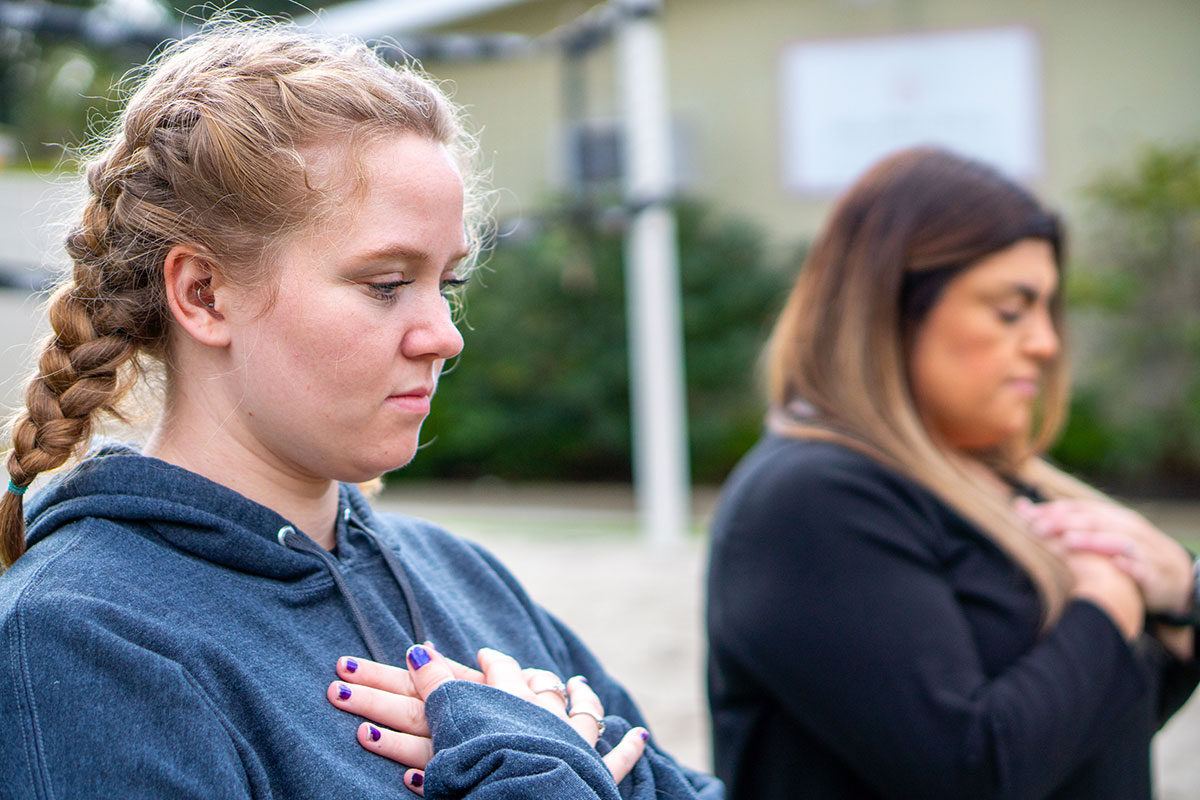 Substance addiction is a prevalent problem among adults and children around the world. Not only does it impact the lives of individuals who suffer from substance use disorder, but it also affects their families. The whole family can experience pain and difficulties as a result of the addiction of one person. In such cases, the siblings of struggling individuals can be a strong support to their suffering loved ones.
Substance addiction is a prevalent problem among adults and children around the world. Not only does it impact the lives of individuals who suffer from substance use disorder, but it also affects their families. The whole family can experience pain and difficulties as a result of the addiction of one person. In such cases, the siblings of struggling individuals can be a strong support to their suffering loved ones.
Since mental illness affects women more than men, it is important to make treatment for women accessible and available. Fortunately, here at New Directions for Women, we offer treatment that specifically addresses the needs of women suffering from addiction and mental health challenges. So, if you have a sister who is suffering from substance abuse, allow us to help.
Understanding the Symptoms of Addiction
In many cases, drug and alcohol addiction can be easily hidden from parents or friends. But, close siblings are typically able to recognize when something is happening in their siblings’ lives. If you believe your sister is misusing drugs or alcohol, you may notice these changes in her behavior or appearance:
- Frequent intoxication: You might notice her appearing intoxicated quite often, presenting signs like bloodshot eyes, tipsy walking, etc.
- Poor memory: Your sister may begin struggling to remember even the most important events, situations, occurrences, and details in her life. She may forget to keep appointments or carry out some of her normal responsibilities.
- Increase in fatigue: Substance abuse most often increases body exhaustion. So, if your sister seems to be tired, weak, or fatigued on a regular basis, this could be a sign of addiction in her life.
- Poor hygiene: If you’ve noticed that your sister is not taking good care of herself, this could be a sign of addiction. Signs of poor hygiene are often associated with substance use disorder.
- Sudden change in weight: Drug abuse impacts body weight over a period. So, if you are seeing a sudden weight gain or weight loss in your sister, she may be dealing with substance abuse.
- Dishonesty: Unfortunately, substance use disorder often leads to changes in the way people behave. Your sister may sometimes avoid telling the truth about her whereabouts in an effort to mask her substance use.
- Problems in studies or work: People who are dealing with addiction often suffer from poor concentration which affects their day-to-day activities like studies or office jobs.
- Mood swings: Moodiness is a common symptom of addiction. If your sister shows symptoms of anger, depression, or low patience level, it may mean she is struggling with substance abuse.
- Social withdrawal: Changing friends or avoiding social events are common signs of addiction.
The Challenges of Being a Sibling to an Addict
 Having a “drug addict sister” can be heartbreaking for the whole family, and figuring out how to deal with your sibling’s addiction can be challenging. Feelings of fear, anger, regret, and uncertainty may fill your heart and mind, as is the case for most siblings of addicts. Unfortunately, the effects of addiction on your family can impact you and your loved ones for many years to come. But, getting your sister the help she needs is how you can begin fighting addiction’s effects.
Having a “drug addict sister” can be heartbreaking for the whole family, and figuring out how to deal with your sibling’s addiction can be challenging. Feelings of fear, anger, regret, and uncertainty may fill your heart and mind, as is the case for most siblings of addicts. Unfortunately, the effects of addiction on your family can impact you and your loved ones for many years to come. But, getting your sister the help she needs is how you can begin fighting addiction’s effects.
One of the most important things you will need to remember throughout this journey is that you can support and help your sister without enabling her. Sometimes, it can be difficult to recognize enabling behaviors. Remember, once you identify and avoid these behaviors, you will be able to truly help your sister find freedom from drug addiction.
Understanding and Managing Codependency in Sibling Relationships
Codependency is a common yet often overlooked issue that can significantly influence the dynamics of addiction within families, particularly between siblings. When one sibling is struggling with addiction, it’s not uncommon for the other to assume a caretaker role, prioritizing the needs of the addicted sibling above their own. This relationship dynamic, while rooted in love and concern, can lead to unhealthy patterns of behavior where the non-addicted sibling enables the addiction by covering up problems, providing money, or even denying the existence of the issue.
Such codependent behavior not only impedes the addicted individual’s motivation to seek help but also places a tremendous emotional and sometimes financial strain on the caretaker sibling. Recognizing and addressing these codependent tendencies is crucial. It involves setting healthy boundaries, seeking support from therapy, and focusing on one’s own needs and well-being. This shift not only aids in the recovery of the addicted sibling by removing enabling behaviors but also empowers the caretaker to lead a healthier, more balanced life.
Recognize and Avoid Enabling Behaviors
It can be difficult to know how to deal with a sister who’s struggling with drug addiction. To help your sister overcome addiction, you may need to do the following:
- Set boundaries and stand by them (tough love).
- Do not ignore her negative or harmful behaviors.
- Encourage her to find a place to live (besides your home).
- Avoid “covering” for her, or being dishonest about her whereabouts or activities.
- Avoid giving her money. (Sadly, she may use it to buy more drugs or alcohol, even if she doesn’t want to behave this way.)
- Do not prioritize her needs over your own needs. (This may seem like an act of love. But, you must not neglect your own health.)
Show Compassion
Being compassionate while avoiding enabling behaviors may seem challenging. But, just try to remember that your sister is dealing with a disease. She is facing a disorder that is extremely difficult to overcome. Contrary to popular belief, addiction is not a choice. But, freedom is. So, keep in mind that your goal now is to help your sister choose that freedom.
Don’t Judge Her
Many individuals who suffer from addiction disconnect from social life because they’re afraid of being judged. As a result, a sense of guilt and shame constantly disrupts their mind. As a sibling, try to understand your sister’s mental health rather than judge her. This might motivate her to change for good.

Create a Healthy Environment
Maintain a healthy environment around your sister to encourage healthy habits. Addiction often takes away normal habits like bathing, eating right, sleeping well, and so forth. Creating a normal environment around her will gradually improve her mental health.
Be Positive
Coping with an addicted sibling is quite challenging. You may encounter many negative emotions, including anger and disappointment. You might even mentally blame yourself, your loved ones, or your sister for the pain addiction is causing in your family. All of that is normal but it is important to focus on remaining mentally healthy. While helping your sister overcome addiction, you can practice self-care. This acts as a form of therapy to help you stay positive and strong during these trying times.
How Can I Talk To My Sister About Her Drug Addiction Without Causing Conflict?
Approaching a conversation about addiction requires sensitivity and care to avoid conflict and ensure the message is received with openness. Here are some tips to guide you:
Choose the Right Time and Place: Find a quiet, private setting where you can speak without interruptions. Ensure both you and your sister are in a calm state of mind and not under the influence of any substances.
Use “I” Statements: Frame your concerns in a way that focuses on your feelings and perceptions. For example, say “I feel worried when I see you struggling,” instead of “You are always making bad choices.”
Express Empathy and Support: Make it clear that your approach comes from a place of love and concern. Reaffirm that you are there to support her journey to recovery, not to judge her.
Listen Actively: Give her a chance to speak and express her feelings. Listening is just as important as speaking in these discussions. Acknowledge her emotions and show understanding.
Avoid Confrontation and Accusation: Keep the tone of the conversation non-confrontational. Avoid blaming or shaming, which can lead to defensiveness and conflict.
Offer Help and Resources: Suggest specific ways you can help or support her decision to seek treatment, such as assisting with research on treatment options or accompanying her to a doctor’s appointment.
By following these guidelines, you can foster a more open and productive dialogue about sensitive issues like addiction, which can encourage your sister to take positive steps toward recovery.
Staging an Intervention for Your Sister
Knowing how to help your sister get treatment for her addiction can be challenging. But, you may want to consider holding an addiction intervention for your sister. During an intervention, you may need to mention actions you will be taking to avoid enabling your sister any further. Be sure to stand by those statements, even when it is difficult to do so.
 Interventions are often the opening move towards recovery from addiction. The process is generally done by close friends and family with the help of a therapist. It is a way to confront the addict to accept her addiction and convince her to receive help.
Interventions are often the opening move towards recovery from addiction. The process is generally done by close friends and family with the help of a therapist. It is a way to confront the addict to accept her addiction and convince her to receive help.
If your family decides to go for intervention to help your sister recover, ensure it is done with empathy and not accusation. It should focus on positive signs of recovery. Consequently, this will motivate your sister to get help. It is always advisable to stage an intervention under the guidance of a professional interventionist.
The process involves several steps like forming a team of professionals, friends, and family. Your group will also need to decide on a time and venue. The meeting will include discussing a list of impactful statements and offering help. Hence, this process needs to be rehearsed several times to avoid making an adverse impact.
Once your sister agrees to undergo treatment, you or another loved one can contact medical experts for advice. There are different forms of treatment for addiction and a specialist can help guide your sibling to the right one for her needs. A successful intervention will result in your sibling getting the help she needs.
What Should I Do If My Sister Refuses Help After An Intervention?
If your sister refuses help even after an intervention, it can be particularly challenging. Here are some steps you can take:
Respect Her Autonomy: While it’s difficult to accept, it’s important to respect her decision. Continue to offer support and make it clear that you are there for her when she is ready to seek help.
Follow Through on Consequences: If specific consequences were outlined during the intervention for not seeking help (e.g., not providing financial support), it’s crucial to follow through. This can help her realize the seriousness of the situation.
Keep Communication Open: Keep the lines of communication open without pressuring her about the decision. Let her know you care about her well-being and are there to support her whenever she decides to discuss her addiction.
Encourage Small Steps: Sometimes, agreeing to smaller commitments like talking to a counselor might be less daunting than entering a treatment program. Suggest less intimidating steps she might take.
Seek Ongoing Support for Yourself: Seeing a loved one refuse help can be emotionally draining. Consider seeking support for yourself, possibly through counseling or support groups, to manage your own well-being.
Revisit the Conversation: After some time has passed and the initial emotions have settled, revisit the conversation. She might be more open to reconsidering her decision once she has had some time to reflect on the intervention and its messages.
Handling a refusal after an intervention requires a delicate balance of support, patience, and firmness in maintaining healthy boundaries. Remember, the decision to seek help is ultimately hers to make.
Treatment Options for Drug Addiction
Some of the common types of addiction treatment programs and approaches include the following:
- Residential treatment: In this method, individuals have access to treatment services around the clock. They live at the addiction rehab facility for the duration of their treatment program. This ensures individuals have the tools and resources they need in order to safely recover from substance abuse.
- Intensive outpatient treatment (IOP): While in an IOP, individuals can receive intensive addiction treatment while living in a sober living environment or another safe, substance-free location.
- Telehealth options: This method of addiction treatment can help clients via telecommunication services without the need to travel long distances. Regular advice is given over telecommunication devices through texting, video calls, phone calls, web-based tools, etc.
- Family therapy: While most treatments focus on physical and behavioral aspects, family therapy focuses on rebuilding strained relationships between family members. This can help an addict heal emotionally and return to a sense of normalcy faster.
Helping Your Sister After Treatment
As your family works through your sibling’s addiction recovery process, it is important to find out how you can help bring healing to the family unit. You can encourage your sister to find a healthier way to live now that abusing drugs is no longer an option. You and other family members can help your sister develop healthy coping methods.
Reconnecting with Family Members and Close Friends
Your sibling may have trouble reconnecting with the people she loves as she goes through recovery. This is not an uncommon challenge for people struggling with addiction. But, families can help their struggling loved ones by being a part of their recovery. Family therapy, support groups, and other resources are available to help you, your parents, and other siblings reconnect with your sister.

Developing a Sense of Responsibility and Accountability
As your sister continues to recover from drug or alcohol addiction, she will need to develop a sense of responsibility. Accountability will be an extremely important component of sobriety as she moves forward. You can help by encouraging her to continue attending therapy and treatment, even when she is struggling to feel motivated.
Recovery requires hard work and dedication. It can be challenging for individuals to stay on track. But, your support can make a big impact on your sister’s journey to recovery. You, your parents, your siblings, and your other family members can give your sister the motivation and love she needs to remain accountable to her commitment to overcoming addiction.
Get Help at New Directions for Women Today
Once your sister is on the road to recovery, it may take a while before life feels “normal” again. She may need help remembering how life has improved in recovery. This is the perfect time to invest some time into strengthening your friendship and encouraging her to thrive. Once she finds her rhythm, it will be one of the most transformative experiences for you and for her. Contact us today to learn more about our substance abuse treatment programs at New Directions for Women. We are here to help.









